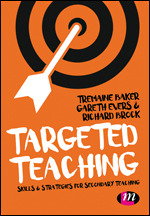You are in: Africa
Change location
You are here
Targeted Teaching

The Skill of Questioning: Quick wins and Slow burners

- Consider statements as prompts for discussion. Rather than asking a direct question, ask students to discuss the validity of a statement which can be a powerful approach to stimulate thought. For example: ‘Talk to your partner about this claim: Higher taxes for the wealthiest harm everyone as they force rich people to emigrate.’
- Vary the types of questions in starters across lessons. Often starters involve factual recall, for example, what is Pythagoras’ theorem? Explore a range of questioning approaches in starters, including divergent and higher-order questions.
- When you plan a question, consider alternative versions at different levels of challenge. For example, what do Buddhists believe about life after death? How are Buddhist beliefs different from Christian beliefs? Why might Buddhist beliefs provide comfort to a mourner? The questions access similar knowledge but set slightly different types of challenge (see Chapter 8).

- Plan the purpose of your questions. When I carry out observations, it sometimes feels as if a teacher is asking questions simply because they believe it is expected of them. In such cases, the questioning appears automatic and unresponsive to the students’ answers. It appears as if the teacher wants the students to guess what is in their head, and any differences or difficulties in understanding are ignored. To avoid this style of questioning, reflect on when and why you will use questions in a lesson. For example, questioning may be used to assess the current level of student understanding, but if that is the reason for your questions, ensure you are responsive to the information. If you are questioning to assess understanding, is this best done to an individual student or using an approach that involves the whole class? If there is evidence of gaps in understanding, plan for opportunities to bridge the gaps in knowledge (see hinge point questions above). Alternatively, you may be using questioning as a tool to stimulate thinking and in that case think about indicators you might use to show that students are genuinely engaging with a question, rather than regurgitating memorised knowledge. Try to make the purpose of your question clear to the students in the class - are they being asked this question so they can show their factual knowledge or is this prompt more about making a strong argument? Questions should arise from a clear pedagogical need which should be transparent to the teacher, the students and anyone watching the lesson.
- Plan for a sequence of questions. It is rare for teachers to ask a single question on its own. Rather than planning questions in isolation, think about the sequence of questions you will ask over the course of a lesson and plan a meaningful progression. Break down the final learning goal into underlying assumptions and necessary knowledge elements and set your questions appropriately. Questions can be useful for priming certain pieces of knowledge that will be brought together to answer a more complex question. It can be useful to anticipate the kind of answers students will give to your questions. Experienced teachers build an awareness of common misconceptions students hold that can interfere with learning. Questioning can be a powerful technique for addressing and challenging these misconceptions. For example, when teaching Newton’s second law, it would be appropriate to probe students’ knowledge of the nature of resultant forces and how they affect the motion of objects. A teacher might anticipate that some students would possess the misconception that an object moving at constant velocity must have a resultant force acting on it and plan questions to probe and attempt to alter this idea. In history, students might see primary sources as a ‘window into the past’ – that is, they believe that primary sources are a true and factual account of historical events. In this case, a teacher would use questions to highlight the motives of the author, which might challenge the perception of the source as an unproblematic record of the past.
This new text challenges the idea that there is a 'best way' to teach. Instead, the authors explain, a more pragmatic approach is required. Teachers need a range of skills and strategies to select from, work with and adapt. Every school, cohort, class and child is different. Beyond that, strategies that worked well with a class one week, may prove ineffective the next.
